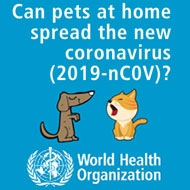
Vets and owners urged to stay up-to-date on advice
The World Small Animal Veterinary Association (WSAVA) has provided updated advice for veterinary professionals and pet owners, following reports from Hong Kong indicating that a low level of COVID-19 virus had been detected in a pet dog.
On Friday 28 February 2020 the Hong Kong Agriculture, Fisheries and Conservation Department (AFCD) released a statement announcing that it had quarantined the pet dog of a patient infected with COVID-19, after nasal and oral cavity samples collected from the animal tested ‘weak positive’ to COVID-19 virus.
According to the AFCD, the dog is not showing any relevant clinical symptoms and is the only animal quarantined in the area at this time.
In a statement the AFCD said: “At present, the AFCD does not have evidence that pet animals can be infected with COVID-19 virus or can be a source of infection to people. The department will conduct close monitoring of [the dog] and collect further samples for testing to confirm if the dog has really been infected with the virus or this is a result of environmental contamination of the dog's mouth and nose."
The WSAVA reaffirmed that there is nothing to suggest that pets can be infected with, nor be a source of infection for, COVID-19. It issued an updated advisory for its members, which includes frequently asked questions and relevant links to guidance from organisations including the World Organisation of Animal Health (OIE) and the Centres for Disease Control and Prevention (CDC).
In its advisory, the WSAVA urges pet owners in areas where there are known human cases of COVID-19 to continue to follow the information provided to avoid contamination, including washing their hands before interacting with their pets.
The Royal Veterinary College (RVC) has also published a statement on the situation. It stated: “There is no current evidence to confirm that the dog itself was infected and it is most likely that the traces of virus were the same as would be found on the clothes or belongings of an infected person.”
The World Health Organization (WHO) has produced an infographic to help allay fears that pet owners may have about the virus and their pets. It can be accessed here.
Image (c) WHO.



 FIVP has shared a survey, inviting those working in independent practice to share their views on the CMA's proposed remedies.
FIVP has shared a survey, inviting those working in independent practice to share their views on the CMA's proposed remedies.